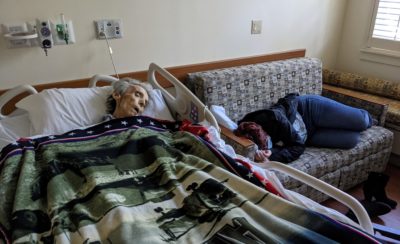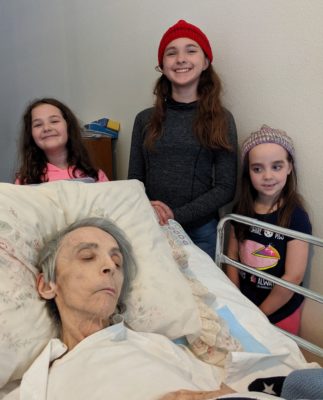This post describes, my recovery from the loss of my wife to a degenerative neurological condition called Huntington’s Disease. She was healed of this condition when she went to live with our Heavenly Father at 2:30AM, the 10th of January 2021. You can read the announcement here.
Or if you would like to read our story from the beginning, you can start with: How We Got Here…
We are continuing to get settled in, and for those of you worried about us Texans, we didn’t lose power or any utilities during Winter Storm Uri – which is a blessing. The main negative about the bad weather has been that we are needing a lot of stuff for the house and nothing is getting delivered. Still, on the whole, that is a minor inconvenience.
A somewhat bigger inconvenience is that when we arrived, we discovered that there was no refrigerator in the place. Hence while it was cold, the garage was our refrigerator and the picnic table on our deck became the freezer. However, the cold is apparently over because it got up into the 60s Saturday, and even the overnight low was still above freezing. To handle that situation, I’m going to try to find a small “dorm room” size fridge to tide us over until our new refrigerator is delivered in a week or so.
As we unpack, we keep finding stuff we didn’t intend to move here – like the Crocs that Janet wore because they helped her balance. I think that the rubber gripped the carpeting in the old apartment better and so she felt more stable. We also found a couple of Provale cups that I bought to help with Janet’s swallowing problems. Each time the cup is tipped, it dispenses exactly 10cc (or about 2 teaspoons) of liquid. I thought that I had a home for both of them but – more about that in a moment. In the meantime, if you could use one of these cups, send me your address via private message and one will be on its way to you.
Even though it was a pain moving in the midst of everything, it has really been worth it. Getting settled in here, I am realizing how many memories the old apartment held. Moving has created a new space for Frannie and I that we can fill with new hopes and new dreams. It must be terrible trying to “move on” when you are surrounded by a place that reminds you of… before.

❦ ❦ ❦ ❦ ❦ ❦
One of the fundamental problems in human conversation (especially with caregivers and others going through grief) is that when someone asks how you are doing, they expect a simple answer. They want to hear me say, “Oh I’m fine.” Or, “This week has been really hard, I still miss her.” Or, “I am so tired all the time. I don’t even want to get out of bed.”
Regardless of what the one answer might be, they want THE answer and that expectation can result in the person answering the question to begin feeling as though there is something wrong with them. However, the truth is that having a loved one die, or begin going through the process of dying, is a very stressful time that calls out a whole smorgasbord of (often conflicting) emotions, and which belies the ability to give simple answers.
This week, I came to a better realization of the exact nature of the feelings in my heart, and I found it contains a curious mixture of tragedy and triumph. On the one hand, I was listening to one of my favorite Moody Blues albums and there was a line in a poem that ran thus:
“Night time, to some a brief interlude
To others the fear of solitude”
The poem is so poignant that it brought me to tears. Right now, I am definitely in the “To others” category, and did I mention that I was listening to it at work on headphones…
In a related issue, early in the week when I found the cups I mentioned earlier, I had contacted a dear friend of mine who had a child with HD, and offered her the cups. She accepted the offer happily, but then Friday just as I was leaving work, I got a message from my friend that her daughter had died. This loss brought up fear for me about my two children who are at risk, and a heaping load of fresh “fear of solitude.”
The storm also got in on the act, bringing on its own feelings of inadequacy. Driving home from work one night, I cried because I realized that I needed Janet back, because Janet would know what to do. Coming from New England, knowing how to deal with winter storm warnings was coded into her DNA. As hard as I tried, all I could think of was to buy bottled water and stock up on batteries for our flashlights. But I was able to find a gas station that had gas and the local Walmart announced that they would stay open until they ran out of stuff to sell, they lost power, or 11pm – whichever happened first. So I managed to get food and other things that we needed.
However, that is not the only side. Remember, I said this is a mixture. In compound with these feelings is a sense of joy that directly contradicts the negativity.
Frannie and I are in a new home, making a fresh start together. We are drawing closer together and I see every day, ways in which Frannie is becoming more self-reliant and confident. It is as though not having Janet in the home has freed Frannie to grow, expand, and flourish. This development, in turn, gives me joy because one of the things that had always worried Janet and me was that Frannie would get drawn into taking care of us and not have a life of her own. But the distance from Houston seems to be drawing her closer to her boyfriend and his family – especially his mother and aunt.
In other news, Saturday it was so warm, we took the dogs out to play in our fenced backyard. This is a whole new sensation for them, to be outside without being on a leash. We have dogs on all three sides of us in the back. They are all larger dogs and Lawtay was running around in circles making friends with all of them.
Then also at work, things are going exceptionally well. It is good to feel useful again, and to work for a company that doesn’t start with the presumption that its employees are lazy jerks who will get away with whatever they can. In addition, I am making great headway in defining the software systems that the company needs and we are ready to start building those new systems. And I think it goes without saying how good it feels to have a steady paycheck coming in.
But how about my friend whose loved one died from HD, that is all bad news, right? Nope. There is good news (in fact, The Good News) there as well. Just as with Janet, death is not the sad end of her loved one’s story either but is instead a release from the grip of a terrible disease.
Yes, in the midst of all the upset and the negatives there is much to be thankful for as well. But where does that leave me? Is life a song or paean of joy and triumphant celebration or it is rife with pain, disappointment and sadness? The answer is obviously, Yes! It is both, pain and paean, so regardless of how bleak things might appear at any one moment, there are always reasons for hope.
In Christ, Amen ☩
❦ ❦ ❦ ❦ ❦ ❦
A prayer for when you can only see the darkness…
“Blessed are You, Lord God, King of the Universe. It is right that I should at all times and in all circumstances bless You for the light that you bring into the world – first at the moment of creation and second through Your coming to live in the world with us. But today I want to bless You especially for all the ways that You bring light into my life. So many times I feel like a puppet being pushed and pulled around by forces that I can’t comprehend or control. But despite those emotions, I can know that You have control of my strings and are directing and guiding my feet. Amen.”




